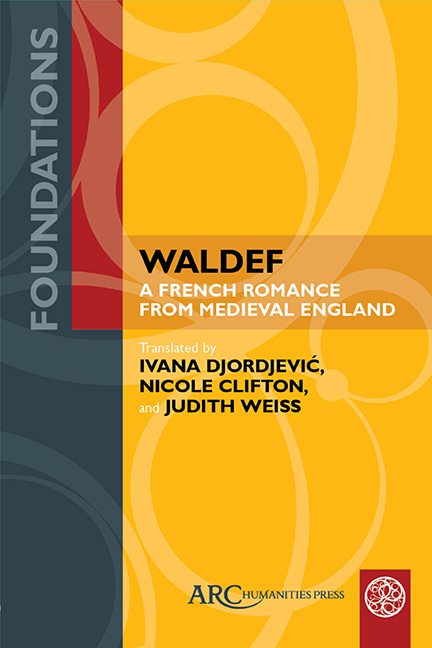Introduction
Published online by Cambridge University Press: 22 June 2021
Summary
DATEDTO APPROXIMATELY 1200–1210, the anonymous romance Waldef provides a foundation myth for East Anglia, particularly Norfolk. Drawing on a rich combination of earlier romances, classical legends, chronicles, and saints’ lives, the author creates a multi-layered story of pre-Conquest kings whose shifting political alliances lead both to battles and to peace treaties, some brokered by princesses who fall in love opportunely with these belligerent monarchs. Although the author does not name his patron, he claims to write for a lady who wanted to “read and learn” (v. 81). The intended audience is the French-speaking (or at least French-literate) gentry and nobility of England, most likely during the reign of King John. Set in an indeterminate past after the withdrawal of the Roman Empire in 410 and before the Conquest of 1066, the romance underlines the Anglo-Norman upper classes’ identification with their new homeland: the Anglo-Saxon era is their history, too. The adventures of Waldef and his family connect England to a wider world, not only Normandy and France, but Germany and the Mediterranean. At the same time, the romance problematizes that connection, as Waldef's sons overreach their ability to rule outside their father's kingdom.
The romance critiques social structures and political actions as well as chivalric values. Its protracted battles repeatedly reveal the difficulties inherent in shaping and maintaining alliances, as well as emphasizing the value of reconciliation and forgiveness. It also traces fault-lines and conflicts within families, particularly between fathers and sons. The author reworks one common romance motif, the separation and reunification of a family, by refusing to allow Waldef to live happily ever after once his lost sons, Guiac and Gudlac, return to him. Instead, the grown sons leave home in search of foreign conquests, rejecting their father's strategy of warring on his neighbours. Their parents grieve their departure, rightly so since the second separation proves permanent: Waldef dies alone, battling the treacherous nephews of a former enemy turned ally. Conflicts continue through generations, rather than achieving lasting resolution.
Similar revisions of familiar tropes occur frequently. The poet combines well-known plot devices in original and thought-provoking ways, interlacing themes so that readers are constantly challenged to re-evaluate their judgments of characters and situations. Because Waldef both draws on earlier tales and influences later stories in both Anglo-Norman and Middle English, it is central to the Anglo-Norman literary corpus.
- Type
- Chapter
- Information
- WaldefA French Romance from Medieval England, pp. 1 - 28Publisher: Amsterdam University PressPrint publication year: 2021



